Star Wars: The Old Republic – hands-on
Can the MMO ever evolve? Discover the future of online gaming
BioWare aim to fill ToR with this kind of mission to a truly extraordinary extent. Each of the six player classes will have an entirely unique, entirely separate story and series of quests. If you were to play each class in turn, you wouldn’t repeat a single mission, or see a repeated location.
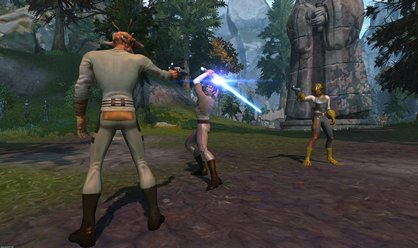
It gets better. Each of those campaigns is the equivalent of one of the previous KotOR games. A grand adventure for each of the six character classes. Each of those campaigns is fully voiced, with multiple paths (and every dialogue choice is spoken. This is probably the largest voiceover project the games industry has ever undertaken). It’s a big, big, big game.
What BioWare are delivering is the largest expansion of detail within the Star Wars universe ever conceived. They’re fleshing out one of the least detailed periods of Star Wars history, where Sith and Jedi existed in mutual antagonism for centuries – the galaxy teetering on the brink of war, having already suffered many catastrophic conflicts, culminating in the sacking of Coruscant itself – the galactic capital.
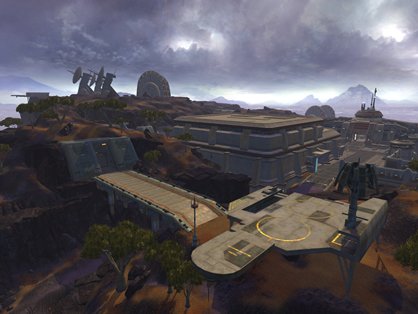
This creates a problem: most people aren’t familiar with the expanded Star Wars universe. BioWare have groundwork to do, as Vogel explains: “So all this stuff we’re doing around the game: the comic, the timeline videos, that’s all to bring people up to speed with the setting. Millions of people have played KotOR but we want millions more who have not played a KotOR game to be up to speed with the setting and engaged in this universe. That’s why we’re doing all that stuff.”
This kind of development comes naturally to BioWare after years of RPG development. They’re a veritable content-building army. But their multiplayer gaming comes from a different angle: they’ve had to hire staff who were more familiar with the MMO scene. Did that create problems? “Not really,” says Vogel, “because even the single-player guys want to make multiplayer games, and they want to solve these problems.”
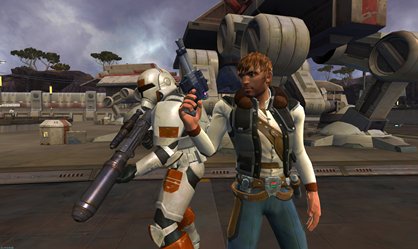
What was more important still was that BioWare, like Valve, get a playable prototype in place as soon as is feasible, and start designing by playing. “We get stuff up very early, and make sure it works,” says Vogel. “If something doesn’t work you just let it go as quickly as possible.”
This philosophy is what has made ToR’s combat system so excitingly diverse. BioWare have developed different game mechanics for every character class. The Jedi and Sith are melee-focused magic users, while smuggler and trooper classes will use cover to keep out of trouble, and fight with blasters. The bounty-hunter, the only other class so far revealed, can use the kinds of tools we seldom see in MMOs: a jetpack and a flamethrower. Walton explains that this was intentional: “You have to do that if you want players to have different experiences while playing together.” Each of the classes has their own separate game mechanic, and each needs to be catered to within the layout of the levels. As we trundle down a Star Destroyer corridor as a Sith, we notice abandoned equipment lockers and crevices at the side of the room.
Sign up to the GamesRadar+ Newsletter
Weekly digests, tales from the communities you love, and more
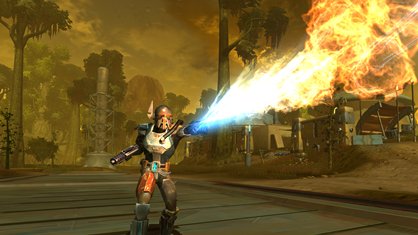
“Hmm. Are they for the smuggler class to hide behind?”
“Yes. It’s causing a real headache for our level designers.”
And all this takes place in the name of fun. BioWare want their first MMO to be as full of life, character and story as their single-player RPGs. “We have to ignore the top of the hardcore,” says Walton, talking about those players who will simply ignore the story and min-max their way to the top end of the game. “We need to make a game that is accessible to the Star Wars fan, and the BioWare fan. Because really BioWare is a company that is about making a great RPG experience, not about making games for a hardcore MMO audience.”
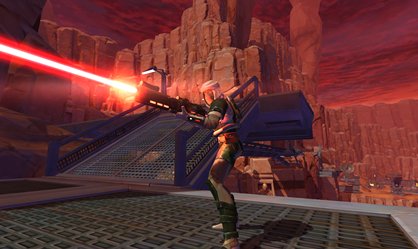
“We’ve been iterating the first ten levels, and playing, and making changes based on that. You have to get the foundations right if you’re going to make the entire game work. We have a person who works on balance for PvE, a person working on choreography... And fun dominates that. Balance means balancing for fun. Is it fun? Then that’s how it should work.”


